小学英语语法一般将来时
- 格式:docx
- 大小:10.64 KB
- 文档页数:4
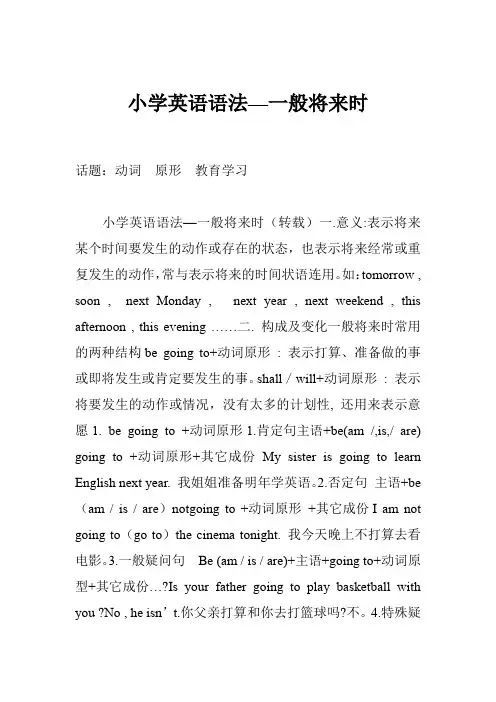
小学英语语法—一般将来时话题:动词原形教育学习小学英语语法—一般将来时(转载)一.意义:表示将来某个时间要发生的动作或存在的状态,也表示将来经常或重复发生的动作,常与表示将来的时间状语连用。
如:tomorrow , soon ,next Monday , next year , next weekend , this afternoon , this evening ……二. 构成及变化一般将来时常用的两种结构be going to+动词原形: 表示打算、准备做的事或即将发生或肯定要发生的事。
shall/will+动词原形: 表示将要发生的动作或情况,没有太多的计划性, 还用来表示意愿1. be going to +动词原形1.肯定句主语+be(am /,is,/ are) going to +动词原形+其它成份My sister is going to learn English next year. 我姐姐准备明年学英语。
2.否定句主语+be (am / is / are)notgoing to +动词原形+其它成份I am not going to(go to)the cinema tonight. 我今天晚上不打算去看电影。
3.一般疑问句Be (am / is / are)+主语+going to+动词原型+其它成份…?Is your father going to play basketball with you ?No , he isn’t.你父亲打算和你去打篮球吗?不。
4.特殊疑问句特殊疑问词(Wh-)+一般疑问句?Where are you going to spend Spring Fesital.? 春节你打算在哪过?5.注意: be going to 结构后面习惯上不跟go ,come 等表位移的动词,一般用该动词的进行时形式表示。
如: He’s going to New York next week.下周他要去纽约.2.will /shall +动词原形(在书面语中,主语是第一人称时,常用shall ,在口语中,所有人称都可以用will)1.肯定句主语+will/shall+动词原形+其它成份I (shall) write to him next week. 下周我将给他写信。
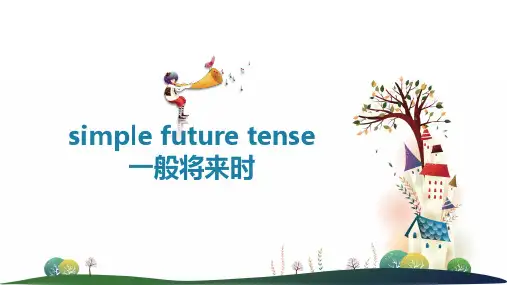

2023年小升初语法总复习(四)一般将来时一、一般将来时的定义:表示将要发生的动作或存在的状态及打算、计划或准备做事情。
句中一般含有以下时间状语:tomorrow, next day(week, month, year...), soon, the day after tomorrow等。
二、一般将来时的句型结构:1.肯定句:(1)will+do,如:We will go shopping tomorrow.我们明天将去购物。
(1)be going to+do,如:I am going to shop tomorrow.我明天将去购物。
2.否定句:在be动词(am, is, are)后加not或情态动词will后加not,也可所写成won’t。
如:I am going to shop tomorrow.-I am not going to shop tomorrow.I will go shopping tomorrow.-I will not go shopping tomorrow.3.一般疑问句:be动词或will提到句首,some改成any,and改为or,第一、二人称互换。
如:I am going to shop tomorrow.-Are you going to shop tomorrow?I will go shopping tomorrow.-Will you go shopping tomorrow?4.特殊疑问句:特殊疑问词+一般疑问句?一般将来时中对画线部分提问有三种情况:(1)问人:Who如:I am going to school.(对画线部分提问)Who’s going to school?(2)问干什么:What...do如:My father is going to watch a race with me this afternoon.(对画线部分提问)What is your father going to do with you this afternoon?(3)问什么时候:When如:Yang Ling is going to play football tomorrow .(对画线部分提问)When is Yang Ling going to play football?【即时演练】一、用所给动词的适当形式填空。
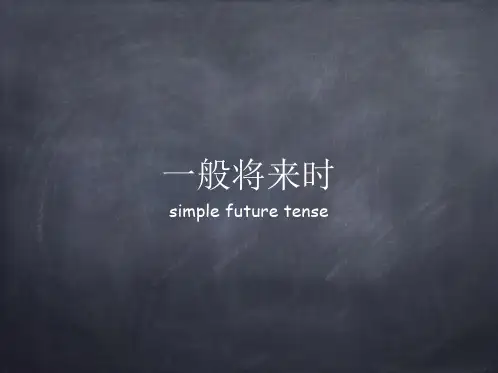
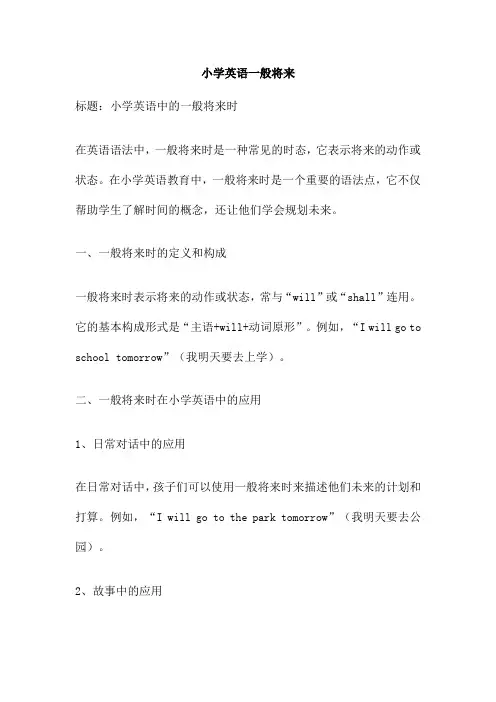
小学英语一般将来标题:小学英语中的一般将来时在英语语法中,一般将来时是一种常见的时态,它表示将来的动作或状态。
在小学英语教育中,一般将来时是一个重要的语法点,它不仅帮助学生了解时间的概念,还让他们学会规划未来。
一、一般将来时的定义和构成一般将来时表示将来的动作或状态,常与“will”或“shall”连用。
它的基本构成形式是“主语+will+动词原形”。
例如,“I will go to school tomorrow”(我明天要去上学)。
二、一般将来时在小学英语中的应用1、日常对话中的应用在日常对话中,孩子们可以使用一般将来时来描述他们未来的计划和打算。
例如,“I will go to the park tomorrow”(我明天要去公园)。
2、故事中的应用在故事中,一般将来时常常用来描述未来的事件和情境。
例如,“In the future, there will be no more cars”(未来将没有汽车)。
3、写作中的应用在写作中,孩子们可以使用一般将来时来描述未来的事件和情境。
例如,“In 10 years, I will be a doctor”(十年后,我将成为一名医生)。
三、如何教授一般将来时1、讲解语法规则老师需要讲解一般将来时的语法规则,包括它的构成形式、使用方法和注意事项。
通过讲解实例和练习题,让学生理解并掌握这个时态。
2、结合实际情境教学为了让学生更好地理解和应用一般将来时,老师可以结合实际情境进行教学。
例如,在讲解“will”和“shall”的区别时,老师可以让学生设想一个未来的情境,然后使用这两个词进行对话。
3、大量阅读和写作练习阅读和写作是帮助学生掌握一般将来时的有效方法。
通过大量的阅读和写作练习,学生可以更好地理解这个时态的用法,并且在实际语境中运用自如。
四、总结一般将来时是小学英语中的一个重要语法点,它帮助学生了解时间的概念,规划未来。
通过讲解语法规则、结合实际情境教学和大量阅读、写作练习,可以帮助学生更好地理解和应用这个时态。
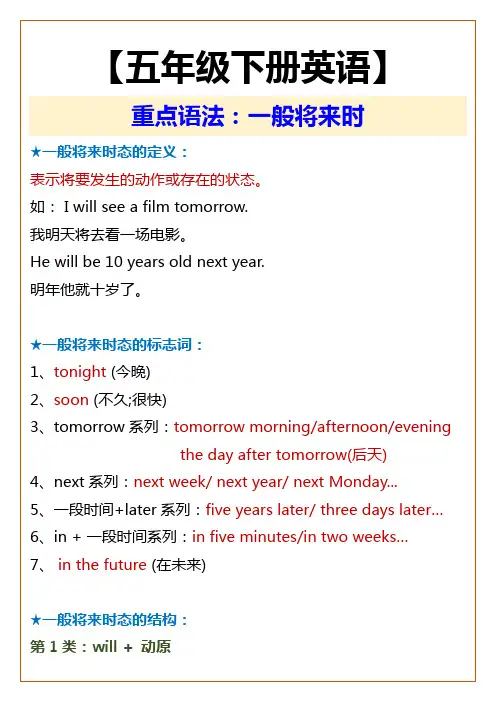
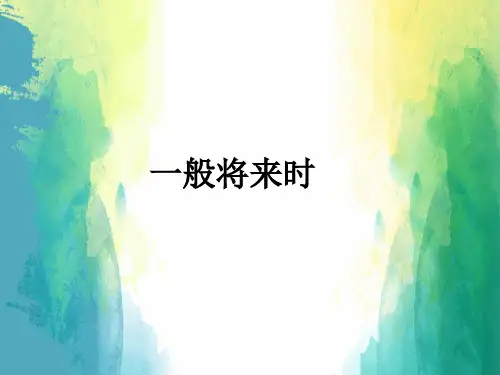
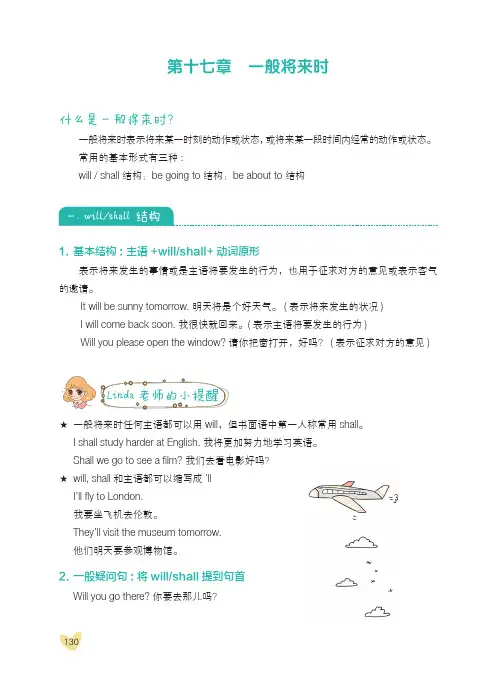
130第十七章 一般将来时 什么是一般将来时?一般将来时表示将来某一时刻的动作或状态,或将来某一段时间内经常的动作或状态。
常用的基本形式有三种:will / shall 结构;be going to 结构;be about to结构1. 基本结构: 主语+will/shall+动词原形表示将来发生的事情或是主语将要发生的行为,也用于征求对方的意见或表示客气的邀请。
It will be sunny tomorrow. 明天将是个好天气。
(表示将来发生的状况)I will come back soon. 我很快就回来。
(表示主语将要发生的行为)Will you please open the window? 请你把窗打开,好吗?(表示征求对方的意见)Linda老师的小提醒★一般将来时任何主语都可以用will,但书面语中第一人称常用shall。
I shall study harder at English. 我将更加努力地学习英语。
Shall we go to see a film? 我们去看电影好吗?★will, shall和主语都可以缩写成’llI’ll fly to London.我要坐飞机去伦敦。
They’ll visit the museum tomorrow.他们明天要参观博物馆。
2. 一般疑问句: 将will/shall提到句首Will you go there?你要去那儿吗?1313. 否定句: 在will/shall 后加not, 可缩写成won ’t/shan ’t陈述句: I will go there. / I shall go there. 我要去那儿。
否定句: I won’t go there. /I shan’t go there. 我不去那儿。
4. 特殊疑问句: 特殊疑问词+ will/shall +主语+动词原形+其他?What will he do this evening? 今晚他准备做什么?(针对动词提问) When will you visit him? 你什么时候去拜访他?(针对时间提问)Where will they have a running race? 他们准备在哪里赛跑?(针对地点提问)be going to 表示主观的打算或计划,一般指近期或事先考虑过的将要发生的动作以及已有迹象表明必将发生某事,意为“打算,就要”。
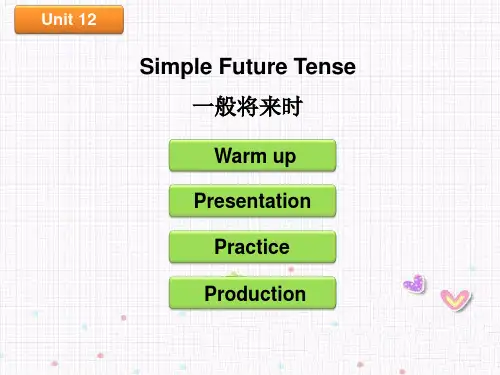
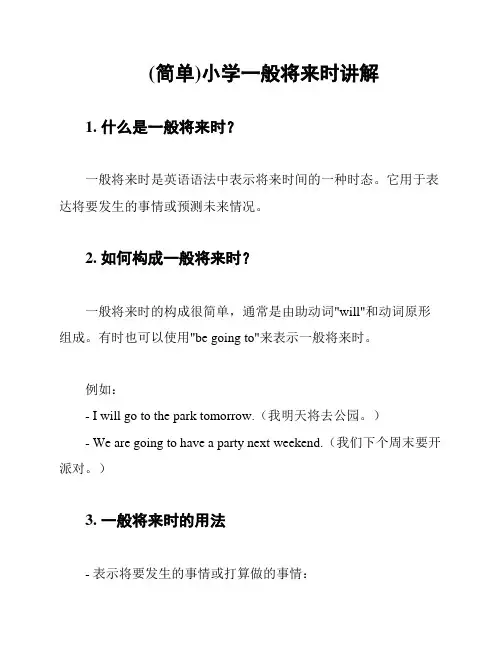
(简单)小学一般将来时讲解1. 什么是一般将来时?一般将来时是英语语法中表示将来时间的一种时态。
它用于表达将要发生的事情或预测未来情况。
2. 如何构成一般将来时?一般将来时的构成很简单,通常是由助动词"will"和动词原形组成。
有时也可以使用"be going to"来表示一般将来时。
例如:- I will go to the park tomorrow.(我明天将去公园。
)- We are going to have a party next weekend.(我们下个周末要开派对。
)3. 一般将来时的用法- 表示将要发生的事情或打算做的事情:- I will call you later.(我等会儿给你打电话。
)- They will have a meeting tomorrow.(他们明天要开会。
)- 表示预测或猜测未来情况:- It will rain this afternoon.(今天下午会下雨。
)- She will probably pass the exam.(她很可能会通过考试。
)- 用于表示意愿、请求、建议、命令等:- Will you help me with my homework, please?(请你帮我做作业好吗?)- You will do as I say.(你要按我说的去做。
)4. 注意事项- 一般将来时通常不能与表示明确的时间状语连用,如"tomorrow"、"next week"等。
- 在第一人称中,可以使用"shall"代替"will",但这在现代英语中很少使用。
- 使用"be going to"时,一般是根据现有迹象进行预测或计划。
5. 例句- She will study abroad next year.(她明年将出国留学。
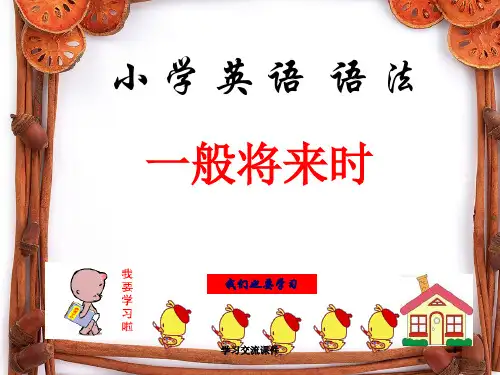
小学英语语法之一般将来时小学英语语法之一般将来时在英语语法中,一般将来时是一种常用的时态,它表示将来要发生的事情。
对于小学生来说,理解并掌握一般将来时的规则和用法是非常重要的。
本文将通过定义、基本语法、句型变化、实例分析和注意事项五个方面,详细介绍小学英语语法之一般将来时。
一、定义一般将来时表示将来要发生的事情,通常与时间状语“will”和“shall”相关联。
例如:1、I will go to the park tomorrow.2、Shall we have a party next weekend?二、基本语法一般将来时的基本语法结构包括否定词、肯定词和连接词。
1、否定词:在一般将来时中,否定词通常使用“not”,例如“I will not go to the party.”表示“我不会去参加聚会”。
2、肯定词:肯定词使用频率最高的就是“will”,表示未来的意愿。
例如“She will bring her book tomorrow.”表示“她明天会带她的书”。
3、连接词:连接词在一般将来时中通常是“and”或“or”,例如“Hewill play football and I will watch TV.”表示“他将踢足球,我将会看电视”。
三、句型变化一般将来时有多种句型变化,以下是常见的几种:1、将来式:主语 + will + 动词原形例如:You will have a new friend next week.2、过去式:主语 + would + 动词原形例如:Last week, he would not eat vegetables.3、现在式:主语 + be going to + 动词原形例如:We are going to watch a movie tonight.四、实例分析让我们通过一些具体的例子来分析一般将来时的用法:例1:My parents will visit us next month. 下个月,我的父母将会来看我们。
语法专题一般将来时1、定义:一般将来时表示将来某个时间要发生的动作或存在的状态2、结构:主语+will\shall\be going to+v(动词原形)+其他例如: It is going to rain. 要下雨了。
We are going to have a meeting today. 今天我们准备开一个会。
Tomorrow will be Sunday. 明天就是星期天。
The rain will stop soon. 雨很快就要停了。
I shall not go. 我不准备去了。
What shall we do for summer holiday?暑假我们做什么呢?注意:用于所有人称,shall用于第一人称()b. will 常简略为 'll,并与主语连写在一起,如:I'll,he'll,it'll,we'll,you'll,they'll。
c. 一般疑问句如用will you…?其简略答语须是Yes,I will或 No,I won't;3、时间标志:常常和表示将来的时间状语连用。
如:tomorrow(明天), next week(下周),from now no(从现在开始),in the future(将来),soon, in 2015, in two days(两天之后)等。
四种句式:1. be going to +动词原形1)肯定句主语+be(am /,is,/ are) going to +动词原形+其它My sister is going to learn English next year. 我姐姐准备明年学英语。
2)否定句主语+be(am /,is,/ are) +not+ going to +动词原形+其它I am not going to(go to)the cinema tonight. 我今天晚上不打算去看电影。
一般将来时一、一般将来时:表示将来某个时间要发生的动作、事情,或存在的状态。
二、.结构:▲(1)主语+will/shall+动词原形+(其他)shall用于主语是第一人称单数,will在陈述句中用于各人称.I shall do my homework tomorrow morning.I/He/She/They will do my/his/her/their homework tomorrow morning. He will get up soon.I will=I Shall=I’ll★在表示客观事实的时候只能用此结构。
(1).It will rain tomorrow.明天将要下雨.(2).It will be Teachers'Day the day after tomorrow.后天将是教师节.(3).My birthday will come.我生日将要到了.▲(2)主语+am/is/are going to+动词原形+(其他)a.主语的意图,即将做某事。
I am going to Shanghai tomorrow.b.计划,安排要发生的事。
The play is going to be produced next month。
c.有迹象要发生的事。
Look at the dark clouds,there is going to be a storm.(3)主语+be+to+动词原形+(其他),表示按计划要发生的事或征求对方意见。
We are to discuss the report next Saturday.(4)主语+am/is/are about to+动词原形,意为马上做某事。
He is about to leave for Beijing.(5)主语+be+v-ing,表示将来,表示按计划即将发生的动作,这类动词有go,come,start,move,sail,leave,arrive,stay,live,fly。
小学英语语法一般将来时1、定义:表示将要发生的动作或存有的状态,以及打算、计划或准备某事。
句中一般含有表示将来的时间状语,如:tomorrow morning,next week,this afternoon等表示将来的时间状语。
2、构成:① be gong to +动词原形如:I am going to see a Beijing opera tomorrow.We are going to meet at bus stop at half past ten.Dad and I are going to see a Beijing opera this afternoon.② will +动词原形如:They will go swimming this afternoon.3、be going to 和will 区别:① be going to表示经过事先安排、打算或决定要做的事情,基本上一定会发生;will则表示有可能去做,但不一定发生,也常表示说话人的临时决定。
如:I am going to take part in a party this evening.They are cleaning the library now. I’ll go and join them.②be going to表示近期或眼下就要发生的事情;will表示的将来时间则较远一些。
如:He is going to write a letter tomorrow. I will meet her one day.③ be going to还能够用来表示有迹象表明某件事将要发生,常用于天气等自然现象。
如:Look! It’s going to rain.4、一般将来时句型转换:肯定句/否定句/一般疑问句及回答She is going to have a picnic tomorrow./She isn’t going to have a picnic tomorrow./—Is she going to have a picnic tomorrow?—Yes, she is. / No, she isn’t.They will go swimming this afternoon./They willnot(wo n’t) go swimming this afternoon./—Will they go swimming this afternoon?—Yes, they will. / No, they won’t.。
小学英语语法一般将来
时
Company number:【WTUT-WT88Y-W8BBGB-BWYTT-19998】
将来时理论及练习
一、概念:表示将要发生的动作或存在的状态及打算、计划或准备做某事。
句中一般有以下时间状语:tomorrow, next day(week, month, year…),soon, the day after tomorrow(后天)等。
二、基本结构:①be going to + do;
②will+ do.
三、否定句:在be动词(am, is, are)l后加not或情态动词will后加not成won’t。
例如:I’m going to have a picnic this afternoon.→ I’m not going to have a picnic this afternoon.
四、一般疑问句: be或will提到句首,some改为any, and改为or,第一二人称互换。
例如:We are going to go on an outing this weekend. → Are you going to go on an outing this weekend?
五、对划线部分提问。
一般情况,一般将来时的对划线部分有三种情况。
1. 问人。
Who 例如:I’m going to New York soon. →Who’s going to New York soon.
2. 问干什么。
What … do.例如: My father is going to watch a race with me this afternoon. →What is your father going to do with you this afternoon.
3. 问什么时候。
When.例如:She’s going to go to bed at nine. →When is she going to bed?
六、同义句:be going to = will
I am going to go swimming tomorrow(明天). = I will go swimming tomorrow. 练习:
填空。
1. 我打算明天和朋友去野炊。
I_____ _______ _________ have a picnic with my friends.
I ________ have a picnic with my friends.
2. 下个星期一你打算去干嘛我想去打篮球。
What ________ ________ _________ _________ _________ next Monday I
_______ ______ _____ play basketball.
What _________ you do next Monday I ________ play basketball.
3. 你妈妈这个周末去购物吗是,她要去买一些水果。
_____ your mother _______ ________ go shopping this ___________
Yes, she _________. She ______ ________ __________ buy some fruit.
4. 你们打算什么时候见面。
What time _______ you _________ __________ meet?
改句子。
5. Nancy is going to go camping.(改否定)
Nancy ________ going to go camping.
6. I’ll go and join them.(改否定)
I _______ go ______ join them.
7. I’m going to get up at 6:30 tomorrow.(改一般疑问句)
________ _______ ________ to get up at 6:30 tomorrow?
8. We will meet at the bus stop at 10:30.(改一般疑问句)
_______ ________ meet at the bus stop at 10:30.
9. She is going to listen to music after school.(对划线部分提问)
________ _______ she ________ ________ _________ after school?
10. My father and mother are going to see a play the day after tomorrow.(同上)
_________ _________ going to see a play the day after tomorrow.
用所给词的适当形式填空。
11. Today is a sunny day. We ___________________ (have) a picnic this afternoon.
12. My brother _______________ (go) to Shanghai next week.
13. Tom often ______________(go) to school on foot. But today is rain. He
______________ (go) to school by bike.
14. What do you usually do at weekends I usually __________ (watch) TV and
____________(catch) insects
15. It’s Friday toda y. What _____she _________ (do) this weekend She
______________ (watch) TV and _____________ (catch) insects.
16. What ___________ (d0) you do last Sunday I ____________ (pick) apples on a farm. What ______________ (do) next Sunday I ______________ (milk) cows.
17. Mary ____________ (visit) her grandparents tomorrow.
18. Liu Tao ____________ (fly) kites in the playground yesterday.
19. David ______________ (give) a puppet show next Monday.
20. I ________________ (plan) for my study now。